
Purpose & Perspective | Agenda | Corporate Volunteering for Refugees | Key Findings & Themes |
Challenges & Conclusion | Presenters & Attendees | Resources & Media
Employers of all sizes are contributing their human and financial resources to aid refugees in their urgent, short-term need as well as longer-term sustainability and integration. The Forum highlighted the examples of nine exemplary companies that are responding with a combination of financial assistance typically funneled to trusted aid organizations, with in-kind products and services, with employment opportunities, and with a range of employee volunteer assistance ranging from hands-on support to the use of highly skilled expertise.
Deutsche Telekom
Volkswagen
IBM
UPS
The Ritz-Carlton
Siemens
Telefonica
RBC
Google
Deutsche Telekom was among the first companies to respond to the refugee crisis with a wide range of supportive initiatives for refugees. Gabrielle Kotulla, Vice President, Corporate Responsibility, explained that they developed a special task force that talked on a weekly basis. Their plans called for sustainable support that would enable the long-term integration of refugees. Deutsche Telekom established services such as free Wi-Fi in refugee reception facilities, launched a refugee portal with information on the asylum process and on living and working in Germany, and a portal with job vacancies in large and small companies. They provided unused Deutsche Telekom buildings for refugee reception centers, and established scholarships and internships for refugees. Through the Deutsche Telekom intranet individual projects for employee volunteers are identified and to date 100 have been implemented to help refugees. Employees are also able to suggest additional projects.
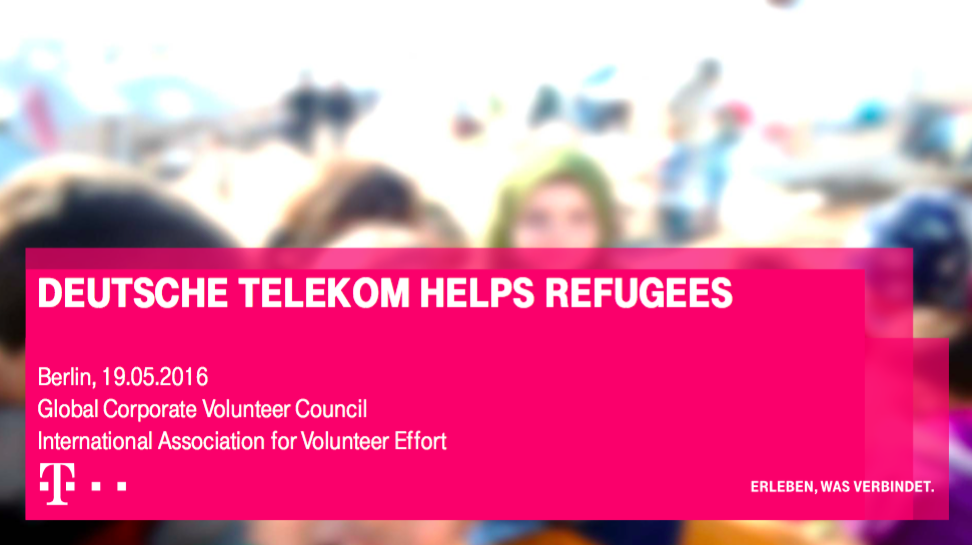
[gdlr_button href=”https://www.iave.org/iavewp/wp-content/uploads/2016/06/Deutsche-Telekom-Forum-Presentation.pdf” target=”_blank” size=”medium” background=”#2b5b73″ color=”#ffffff”]View Presentation [/gdlr_button]
[gdlr_button href=”https://www.iave.org/iaveforum2016/presenter-bios/#gabriele” target=”_self” size=”medium” background=”#2b5b73″ color=”#ffffff”]About the Presenter[/gdlr_button]
Volkswagen was an early responder to the refugee crisis as well. Michael Jansen, Head of the Volkswagen Representative Office in Berlin, shared that Volkswagen also committed to a long-term strategy to assist refugees and to sharing reliable best practices with other companies. As early as July 2015, Volkswagen employee volunteers helped the German Red Cross to convert the former military base Ehra-Lessien to a refugee reception center. The company has provided NGOs access to their vehicle fleet that has been useful in transporting children to school. Volkswagen employee volunteers are provided cross-cultural training through the Volkswagen Group Academy. Employees are awarded paid leave of absences when they volunteer to help refugees.
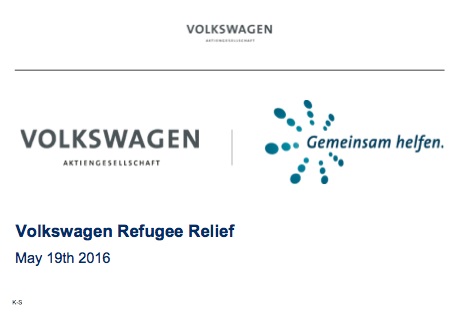
[gdlr_button href=”https://www.iave.org/iavewp/wp-content/uploads/2016/06/VW-Forum-presentation.pdf” target=”_blank” size=”medium” background=”#2b5b73″ color=”#ffffff”]View Presentation [/gdlr_button]
[gdlr_button href=”https://www.iave.org/iaveforum2016/presenter-bios/#jansen” target=”_self” size=”medium” background=”#2b5b73″ color=”#ffffff”]About the Presenter[/gdlr_button]
Some employers such as IBM, had well-established employee volunteer programs in place but were unsure at first how to best leverage the professional skills of employees to help refugees. Employees were eager to help refugees and flooded the “in boxes” of Michael Evason, Corporate Citizenship and Corporate Affairs Manager, EMEA asking what they could do. IBM settled on helping in a variety of ways through pro bono tech donations, grants, software and analytic skills. In Italy, IBM created a mobile and web based application to enable Intersos, the Italian humanitarian aid organization’s, staff to register migrants and collect demographic, health status, family, and socioeconomic information by capturing textual and image data. Peter Kusterer, Corporate Citizenship and Corporate Affairs Manager, Germany, explained how 12 IBM staff members worked with the German Red Cross to develop an IT solution (open source) to help with information management for a refugee reception center in Mannheim. Other grants and volunteer activities are occurring in Austria, Turkey, France, and Sweden.
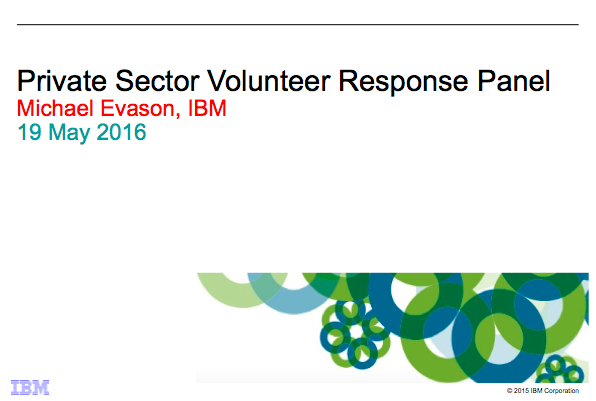
[gdlr_button href=”https://www.iave.org/iavewp/wp-content/uploads/2016/06/IBM-Forum-Presentation.pdf” target=”_blank” size=”medium” background=”#2b5b73″ color=”#ffffff”]View Presentation [/gdlr_button]
[gdlr_button href=”https://www.iave.org/iaveforum2016/presenter-bios/#evason” target=”_self” size=”medium” background=”#2b5b73″ color=”#ffffff”]About Michael Evason[/gdlr_button]
[gdlr_button href=”https://www.iave.org/iaveforum2016/presenter-bios/#peter” target=”_self” size=”medium” background=”#2b5b73″ color=”#ffffff”]About Peter Kusterer[/gdlr_button]
UPS is well positioned to respond to disasters of all sorts. Hans-Peter Teufers, Director, International Humanitarian Supply Chain, illustrated how UPS has lent its assets, employee volunteers and expertise. They provided over $3 million in the past 3 years to organizations providing aid to refugees. 100 UPS employee volunteers have been supporting refugee relief in 15 countries partnering with large global organizations as well as smaller local partners. Activities include delivering Christmas presents to children in camps in the Netherlands, building furniture out of wooden pallets in Belgium, setting up camps, providing transportation and local hospitality in Germany, distributing winter clothing in Austria, and delivering warehouse items on a 3 times per week schedule in Greece.
UPS has lent their expertise through skilled logisticians assessing the capacities of airports, ports and roads, along key supply routes as part of the Logistics Emergency Team (LET). LET is comprised of three of the largest global logistics and transportation companies: Agility, Maersk and UPS, which have worked together since 2007 to support the Logistics Cluster led by the United Nations World Food Programme. The World Food Programme typically activates the LET partners in the case of sudden onset natural disasters that impact more than 500,000 people. The LET companies provide pro-bono assets and services and deploy highly trained experts to join the United Nations staff in disaster areas. UPS is also a founding member of the UNHCR Innovation Circle where they developed the UPS Relief Link, enabling “last mile” tracking of food and nonfood items to ensure equitable distribution.
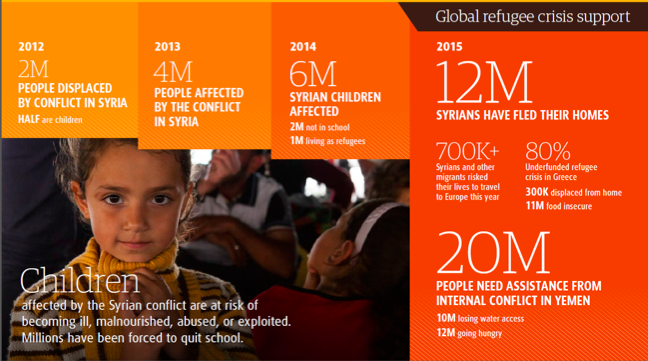
[gdlr_button href=”https://www.iave.org/iavewp/wp-content/uploads/2016/06/UPS-Forum-Presentation.pdf” target=”_blank” size=”medium” background=”#2b5b73″ color=”#ffffff”]View Presentation [/gdlr_button]
[gdlr_button href=”https://www.iave.org/iaveforum2016/presenter-bios/#hans” target=”_self” size=”medium” background=”#2b5b73″ color=”#ffffff”]About the Presenter[/gdlr_button]
The Ritz-Carlton has a well-established employee volunteer program, Community Footprints, in each hotel around the world, but their specific involvement with refugees grew organically as employees in Wolfsburg, Germany gradually observed the needs of residents in a nearby refugee camp. Franziska Streipert, Learning and Quality Manager, related how the 200 employees from the hotel got involved. Employees began by sorting donated clothes for the Red Cross. This inspired them to get more involved. They visited the local refugee camp on a weekly basis, working to understand that the refugees needed a distraction from their situation. The program they developed included showing children how to paint Easter eggs while explaining the tradition, playing board games, and organizing a party for women and children featuring not only German food, but also the food of their country of origin. Award-winning Ritz Carlton chefs also came to the camp to cook for the refugees. Employees from all departments got involved, not only food services, but also housekeeping, accounting, etc.
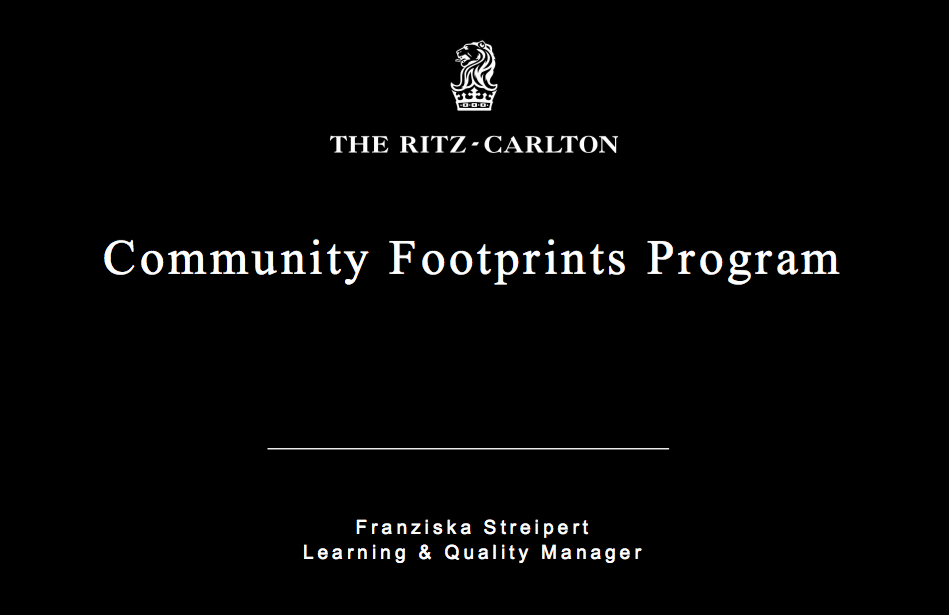
[gdlr_button href=”https://www.iave.org/iavewp/wp-content/uploads/2016/06/Ritz-Carlton-Forum-Presentation.pdf” target=”_blank” size=”medium” background=”#2b5b73″ color=”#ffffff”]View Presentation [/gdlr_button]
[gdlr_button href=”https://www.iave.org/iaveforum2016/presenter-bios/#franz” target=”_self” size=”medium” background=”#2b5b73″ color=”#ffffff”]About the Presenter[/gdlr_button]
Siemens has planned a full range of opportunities for refugees says Eyad El-Khouly, Head of Volunteering and Social Innovation. The company is providing funding (2 million euros to date); job opportunities and employee volunteer support for refugees. Siemens offers two month paid internships for qualified refugees while they are going through the asylum procedure; pre-classes to help them qualify for their apprenticeship program and language classes. Employees are serving as mentors for the refugees in these programs. Siemens offers paid leave of five days per year for employees whose skills are in demand to help refugees – i.e. company doctors. They also house refugees in unused company buildings, and arrange various social activities for refugee children.
“Help shape your own integration” is the slogan under which Siemens and The DO School in Berlin have launched the “Bridging Challenge.” In a workshop lasting several weeks, refugees and experts developed solutions together to plug the gap between what is offered and the refugees’ abilities. Florian Hoffman, founder of the DO School, and partner of Siemens, explained an expectation gap – companies have programs and expect the refugees will go online and find the programs. That isn’t consistently happening. The DO School also held a weeklong workshop with company representatives and refugees. The result was a matching system enabling companies looking for refugee workers to develop profiles of their companies and the skills they desire, and for refugees to develop their own profiles highlighting their skills.
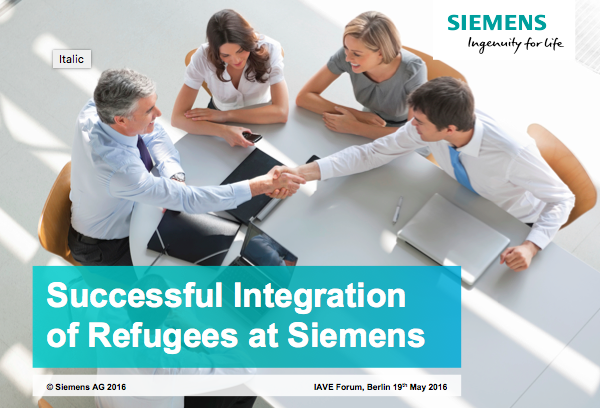
[gdlr_button href=”https://www.iave.org/iavewp/wp-content/uploads/2016/06/Siemens-Forum-Presentation.pdf” target=”_blank” size=”medium” background=”#2b5b73″ color=”#ffffff”]View Presentation [/gdlr_button]
[gdlr_button href=”https://www.iave.org/iaveforum2016/presenter-bios/#eyad” target=”_self” size=”medium” background=”#2b5b73″ color=”#ffffff”]About the Presenter[/gdlr_button]
In Spain, Telefonica has an employee volunteer program with a high level of employee involvement that often includes family and friends. Lula Ballarino, Global Manager, Corporate Volunteering, told Forum participants that they decided to focus on meeting urgent needs like food and clothing and long term needs such as integration into Spanish society. To accomplish this, Telefonica is collaborating with recognized aid organizations with deep expertise on refugees such as UNHCR, the Spanish Red Cross, and local organizations. To date 150 employees have volunteered specifically to help the refugees through 20 different projects implemented in the last eight months. Employees collected bikes for refugees, organized a joint bike ride and are planning a bike repair clinic. Volunteers help the newcomers learn the Spanish language and culture. Volunteers and refugees worked together to build urban gardens within a refugee residence. While they have found that the language and cultural barrier can be a challenge, and that female refugees were not participating in many of their programs, they are working to overcome these challenges with additional training for volunteers plus creation of a virtual community for volunteers to share experiences. Employees located outside of Spain are also helping through on-line volunteering in areas of communications, web design and translation.
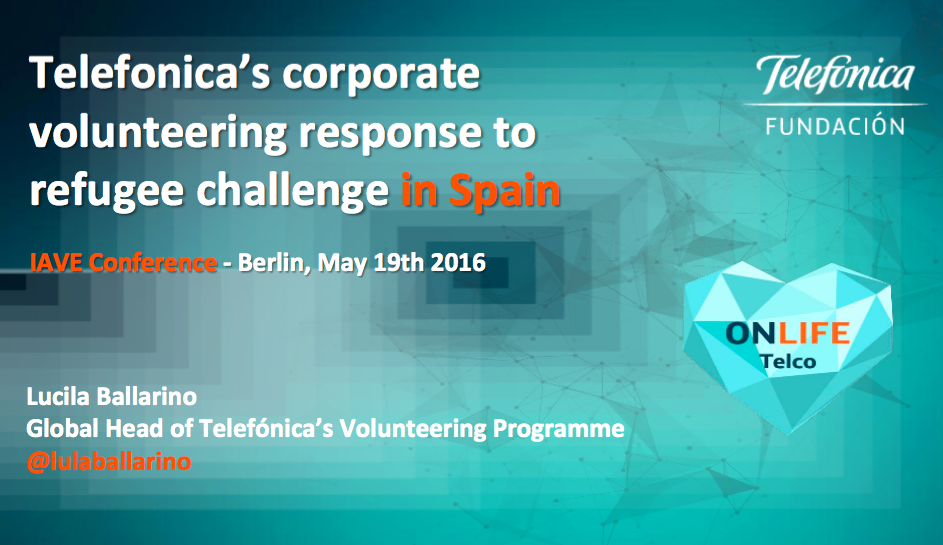
[gdlr_button href=”https://www.iave.org/iavewp/wp-content/uploads/2016/06/Telefonica-Forum-Presentation.pdf” target=”_blank” size=”medium” background=”#2b5b73″ color=”#ffffff”]View Presentation [/gdlr_button]
[gdlr_button href=”https://www.iave.org/iaveforum2016/presenter-bios/#lula” target=”_self” size=”medium” background=”#2b5b73″ color=”#ffffff”]About the Presenter[/gdlr_button]
Canada accepts around 200,000 newcomers each year and recently committed to take in 25,000 refugees. In Canada, newcomers are very much a part of the society and welcoming them is woven into companies like RBC’s business strategy according to Tanya Bell, Senior Manager, Citizenship Engagement Programs. She works with RBC’s Employee Resources groups and local settlement agencies to create employee volunteer activities supported with grant funding. A major employee volunteer initiative with the national charity, Immigrant Access Fund, is in the works. Additionally, specific RBC banking products are specially designed for new Canadians.
In times of disasters and crises, Google’s strategy is to commit people (talent, skills & resources through Googlers Give), money (through Google.org), and products (through Crisis Response Team). The company is particularly committed to disaster response and recovery, and views the refugee crisis as a “disaster”, dispensing a total of 11 million euros from the company and 1.2 million euros from employees to alleviate the refugee crisis according to Hector Mujica, Social Responsibility Regional Manager. In addition highly skilled corporate volunteers/engineers have engaged in projects to aid refugees.
Early in the refugee crisis Google collaborated with Cisco and the nonprofit NetHope to install Wi-Fi networks and device charging stations along the refugee route in various locations throughout Central Europe. Working again with Net Hope, Google through Project Reconnect, provided funds to nonprofits to purchase 25,000 Chromebooks. The Chromebooks are equipped with education and language learning apps. Selected nonprofits will in turn, provide access to them to refugees in Germany. Project Reconnect enables non-profits to use the devices to build Internet cafes and organize educational events for children. As part of this partnership, Deutsche Telekom is giving the nonprofit grant recipients a discount on broadband access.
Since the migrants and refugees coming to Europe are equipped with smartphones, and use them to find information, communicate, and navigate their way to their destination,
Google has designed a “Crisis Info Hub” that provides vital information via smartphones on ports, transport links, medical info, and places to sleep, and is available in English, Arabic, and other languages. It’s built in collaboration with the International Rescue Committee and Mercy Corps, and is open source.